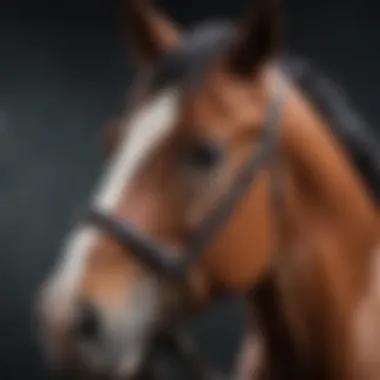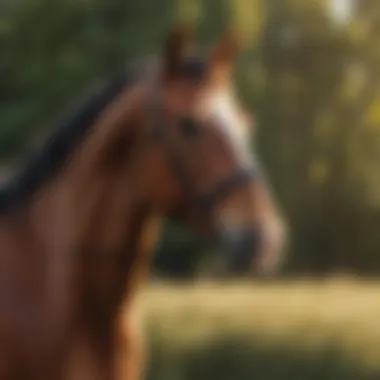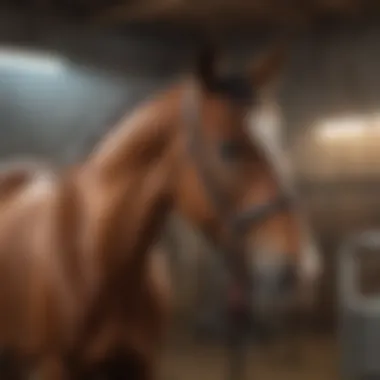Your Ultimate Guide to Buying a Real Horse: Essential Tips and Considerations


Credit Management
As you delve into the intricate world of purchasing a real horse, it's imperative to consider the parallel of credit management in the realm of financial stewardship. Just as maintaining a healthy credit score is crucial for accessing favorable loans, ensuring the well-being and future prospects of your equine companion necessitates sound decision-making. Acquainting yourself with the importance of credit scores can pave the way for securing the financial stability required for a successful horse purchase. Furthermore, understanding ways to bolster your credit score will serve as a fundamental building block in safeguarding your investment in these majestic creatures. Lastly, vigilantly monitoring your credit report mirrors the diligence and attentiveness required in the diligent care of a real horse, ensuring that no detail goes unnoticed and no potential issue goes unaddressed.
Home Buying Tips
Transitioning from the complexities of credit management, the domain of home buying beckons with its own set of considerations. Nevertheless, drawing parallels to the process of purchasing a real horse unveils striking similarities in the meticulous evaluation and decision-making necessary for a fruitful acquisition. Delving into the steps entailed in the home buying process equips one with a systematic approach akin to the careful considerations required before bringing a horse into your care. Factors such as location, amenities, and budget converge in both spheres, demanding prudent assessment for a harmonious match between buyer and property, or owner and equine companion. Mortgage options and rates offer a mirroring reflection of the financial intricacies present in both arenas, emphasizing the importance of sustainable financial planning and foresight.
Refinancing Strategies
Navigating the terrain of refinancing strategies draws uncanny parallels to the cyclical nature of horse ownership. Just as considering refinancing may offer opportunities for optimizing financial expenditures, reassessing the care and training regimen of your horse can yield enhanced health and performance outcomes. Timing is of essence in both scenarios, prompting a careful evaluation of when to pursue refinancing or amendments to your equine management approach. Exploring the diverse landscape of refinancing options mirrors the array of training techniques and health therapies available to horse owners, underlining the significance of tailoring strategies to individual needs and circumstances. Furthermore, weighing the pros and cons of refinancing echoes the considerations required in balancing risk and potential benefits, fostering a dynamic and adaptive approach in both financial and equestrian realms.
Retirement Planning
Embracing the horizon of retirement planning unveils interconnected threads between financial foresight and equine longevity. Setting robust financial goals for retirement mirrors the deliberate planning required for ensuring the well-being and security of horses in their later years. Knowledge of retirement account options serves as a reminder of the diverse care regimes available for aging equines, with each avenue tailored to provide specific forms of support and maintenance. Delving into social security and pension plans widens the scope of retirement considerations, highlighting the need for comprehensive approaches to securing financial stability post-career - a mirror to the dedicated retirement plans crafted for our equine partners.
Insurance Options
The tapestry of insurance options weaves a protective shield around both financial portfolios and equine companions. Exploring the spectrum of insurance coverage echoes the diverse safeguards available to mitigate risks and ensure peace of mind in unforeseen circumstances. Selecting the right insurance policies resonates with the careful selection of equine insurance plans, with each offering varying levels of coverage tailored to different needs. The importance of life insurance and health insurance transcends human contexts, compelling conscientious horse owners to extend the mantle of protection to their equine counterparts. Just as comprehensive insurance offers a layer of security in the face of uncertainties, securing adequate insurance for your horse shields against unforeseeable eventualities, safeguarding your investment and the well-being of your beloved companion.
Understanding the Purchase of a Real Horse
In this extensive guide to purchasing a real horse, we delve into the crucial preliminary step of understanding the acquisition process, a cornerstone of a successful equine venture. Being well-informed about the nuances of purchasing a horse is paramount to making a well-considered decision. By comprehensively exploring factors such as financial readiness, skill assessment, time commitment, and necessary facilities, individuals can approach horse ownership with confidence and foresight.
Factors to Consider Before Buying
Budget and Financial Preparedness
Embarking on the journey of owning a horse necessitates meticulous financial planning. Budgetary considerations encompass not only the initial purchase price but also the assorted costs involved in long-term maintenance and care. Ensuring financial preparedness is essential to guarantee the well-being and welfare of the horse throughout its life.
Skill Level and Experience
One's level of expertise and familiarity with equine care play a vital role in determining the suitability of horse ownership. Novice riders may opt for well-trained, docile breeds, while experienced equestrians could handle more spirited horses. Assessing one's skill level honestly is imperative for a harmonious human-horse interaction.
Time Commitment
The time constraints associated with owning a horse are substantial. Daily care, training sessions, and exercise routines demand a significant portion of the owner's schedule. Acknowledging the substantial time investment required ensures that prospective owners are prepared for the dedication and consistency necessitated by equine companionship.
Space and Facilities


Stabling, pasture turnout, and adequate facilities are essential components of responsible horse ownership. Housing requirements vary based on the horse's breed, age, and temperament. Sufficient space and appropriate infrastructure are paramount for ensuring the horse's physical and mental well-being.
Types of Horses to Consider
Breeds
The selection of the horse's breed influences its temperament, behavioral traits, and suitability for specific disciplines. From spirited Thoroughbreds to steady Quarter Horses, each breed offers distinct characteristics appealing to different riders. Understanding the breed's attributes empowers buyers to choose a compatible equine partner.
Ages
The age of a horse impacts its training requirements, health considerations, and longevity potential. Younger horses necessitate patient, consistent training, while older equines may require specialized care. Matching the horse's age to the owner's capabilities and aspirations is integral to fostering a successful partnership.
Temperament
A horse's temperament, encompassing its disposition and mannerisms, profoundly influences its compatibility with an owner. Tolerant, gentle horses suit novice riders, whereas more spirited individuals may challenge experienced equestrians. Evaluating a horse's temperament aligns with establishing a harmonious bond and fulfilling equine-human interaction.
Where to Buy a Real Horse
Private Sellers
Procuring a horse from private sellers offers personalized attention, detailed animal histories, and tailored guidance throughout the purchase process. Direct interactions with sellers provide valuable insights into the horse's background, temperament, and training, facilitating an informed decision-making process.
Breeders
Purchasing a horse directly from a breeder ensures access to well-bred, pedigreed animals with documented lineage and health records. Breeders, well-versed in equine genetics and breeding practices, offer valuable expertise on selecting a horse that aligns with the buyer's preferences and aspirations.
Auctions
Auctions present a diverse array of horses spanning different breeds, disciplines, and training levels. While auctions provide a platform for acquiring horses quickly, buyers must exercise caution to evaluate the horse's health, temperament, and suitability thoroughly. Attending auctions requires adeptness in assessing horses swiftly and making informed decisions under pressure.
Rescue Centers
Adopting a horse from a rescue center not only provides a second chance for a deserving equine but also offers a gratifying experience for the new owner. Rescued horses often showcase resilience, loyalty, and gratitude, enriching the owner's equine journey with their poignant stories and transformative potential.
Understanding Costs and Expenses
Understanding Costs and Expenses holds significant importance in this article. It delves into the financial aspects associated with buying a real horse, shedding light on the financial commitments and considerations crucial for prospective horse owners. By addressing the monetary requirements upfront, this section equips readers with the foresight needed to make informed decisions regarding their horse purchase.
Initial Purchase Costs


Price of the Horse:
The Price of the Horse plays a pivotal role in the initial purchase costs. It signifies the financial investment required to acquire a horse, varying based on factors like breed, age, training, and overall quality. Understanding the Price of the Horse is essential as it influences the budgeting process and filters options based on financial constraints and preferences. Whether opting for a young prospect or a seasoned performer, the Price of the Horse dictates the financial threshold for purchasing a horse, impacting long-term financial stability within the equestrian realm.
Evaluation and Vet Checks:
The Evaluation and Vet Checks aspect is crucial in the horse buying process. It involves thorough examinations by qualified veterinarians to assess the horse's health, soundness, and suitability for the intended purpose. Emphasizing Evaluation and Vet Checks helps buyers mitigate potential risks associated with undisclosed health issues or unsuitability, ensuring a transparent transaction and safeguarding the horse's welfare post-purchase. Despite adding to the initial costs, thorough Evaluation and Vet Checks serve as a prudent investment in securing a healthy and compatible equine partner.
Transportation:
Transportation stands as a key consideration in the initial purchase costs. It encompasses the logistical arrangements required to safely transport the horse from its current location to the buyer's premises. Evaluating Transportation options is vital to ensuring the horse's stress-free relocation and acclimatization to its new environment. While involving additional expenditure, quality Transportation services alleviate the burden on buyers, providing a seamless transition for the horse and facilitating a smooth start to the ownership journey.
Ongoing Expenses
Exploring Ongoing Expenses highlights the financial commitments associated with owning a horse beyond the initial purchase. Covering aspects like feeding, healthcare, and maintenance, this section prepares individuals for the continuous care and financial outlay essential for sustaining a healthy and happy equine companion.
Feed and Nutrition
The aspect of Feed and Nutrition encompasses the dietary requirements critical for a horse's health and performance. Prioritizing Feed and Nutrition emphasizes the significance of providing balanced and tailored meals, ensuring optimal physical condition and well-being for the horse. By delving into Feed and Nutrition, owners gain insight into quality feeding practices, fostering a strong foundation for the horse's overall health and performance.
Stabling and Boarding
Stabling and Boarding represent integral components of ongoing expenses. They pertain to the accommodation and care facilities necessary for housing and managing the horse. Understanding Stabling and Boarding requirements enables owners to select suitable facilities aligning with the horse's needs and their budget. While involving recurring costs, investing in quality Stabling and Boarding contributes to the horse's welfare and comfort, reflecting a commitment to providing optimal living conditions.
Veterinary Care
Veterinary Care plays a fundamental role in safeguarding the horse's health and well-being. It encompasses routine check-ups, vaccinations, and medical treatments essential for preventing illnesses and maintaining the horse's health. Prioritizing Veterinary Care ensures proactive healthcare management, addressing any health concerns promptly and fostering a lasting bond built on trust and vigilance. Despite constituting ongoing expenses, Veterinary Care reflects a responsible approach to equine ownership, prioritizing the horse's welfare above all.
Farrier Services
Farrier Services hold significance in the regular maintenance of a horse's hooves and overall hoof health. They include trimming, shoeing, and corrective procedures necessary for ensuring proper biomechanics and soundness. Acknowledging the importance of Farrier Services underscores a commitment to the horse's comfort and soundness, recognizing the pivotal role of hoof care in promoting locomotion and preventing injuries. While incurring periodic expenses, investing in Farrier Services contributes to the horse's overall well-being and longevity, reflecting a proactive stance towards preventive care.
Tack and Equipment
Tack and Equipment encompass the gear and accessories essential for riding, handling, and caring for the horse. They range from saddles and bridles to grooming tools and protective wear, enhancing the rider's experience and the horse's comfort. Recognizing the value of Tack and Equipment underscores the importance of quality gear in ensuring safety, performance, and overall enjoyment during interactions with the horse. While requiring initial investment, prioritizing Tack and Equipment enables owners to provide optimal care and equipment for the horse's needs, fostering a harmonious partnership built on trust and comfort.
Maintaining Your Real Horse In this comprehensive guide to buying a real horse, one must not overlook the critical aspect of maintaining the equine companion. Ensuring the well-being and longevity of your horse is paramount for a fulfilling ownership experience. Careful attention to various elements such as diet, exercise, health monitoring, grooming, and building a strong emotional bond is imperative for a harmonious and healthy relationship with your equine partner.
Equine Care and Well-being


Diet and Nutrition
‣ Within the realm of equine care, diet and nutrition play a fundamental role in the overall health and performance of a horse. An appropriate diet, tailored to the specific needs of the individual horse, is crucial for optimal physical condition and energy levels. Nutritious feed, including high-quality hay, grains, and supplements, contributes significantly to the horse's well-being. Regular monitoring of the horse's dietary intake enables owners to make adjustments for any specific nutritional requirements, equipping the horse with the necessary nutrients for vitality and resilience.
Exercise and Training
‣ Exercise and training are integral components of maintaining a real horse. Regular physical activity not only ensures the horse's physical fitness but also promotes mental stimulation and behavioral balance. Engaging in various forms of exercise, such as riding, lunging, or turnout, allows the horse to build muscle strength, improve flexibility, and enhance coordination. Consistent training sessions foster discipline and responsiveness in the horse, forming a strong foundation for effective communication between the horse and the rider.
Health Monitoring
‣ Health monitoring is a critical aspect of equine care, necessitating vigilant observation and proactive measures to safeguard the horse's well-being. Regular veterinary check-ups, vaccinations, dental care, and parasite control are essential components of health maintenance. Timely identification of any health issues enables prompt intervention and treatment, ensuring the horse's sustained health and vitality for years to come.
Grooming and Hygiene
‣ Grooming and hygiene practices are not mere aesthetics but essential for the overall health and comfort of the horse. Regular grooming sessions, including brushing, mane and tail care, hoof trimming, and bathing, contribute to the horse's physical well-being and mental relaxation. Maintaining proper hygiene minimizes the risk of skin infections, promotes circulation, and enhances the bond between the horse and its owner through tactile interactions.
Building a Relationship with Your Horse
Establishing Trust
‣ Establishing trust forms the cornerstone of a successful and harmonious relationship between a horse and its owner. Trust is built through consistency, patience, and respect in all interactions with the horse. Creating a safe and supportive environment allows the horse to develop trust in its human companion, fostering mutual understanding and cooperation for various activities.
Training and Bonding
‣ Training and bonding sessions are invaluable for strengthening the emotional connection between the horse and its owner. Through positive reinforcement, clear communication, and progressive training techniques, owners can enhance the horse's skills and responsiveness while deepening the bond of mutual trust and respect. Regular training sessions not only improve the horse's performance but also cultivate a sense of partnership and camaraderie between the horse and its owner.
Understanding Behavioral Cues
‣ Recognizing and interpreting behavioral cues is essential for effective communication and relationship-building with a horse. Understanding the horse's body language, vocalizations, and responses enables owners to address the horse's needs and emotions with empathy and sensitivity. Enhanced awareness of behavioral cues fosters a deeper connection and mutual understanding between the horse and its owner, laying the foundation for a cohesive and rewarding partnership.
Final Thoughts on Buying a Real Horse
Owning a real horse entails more than a mere financial transaction; it necessitates an enduring dedication and sense of responsibility. The section on Final Thoughts emphasizes the paramount importance of commitment in the equestrian world. It serves as a cornerstone for individuals considering horse ownership, underscoring the profound impact that responsible decision-making can have on both the horse's well-being and the owner's satisfaction. As the final segment of this comprehensive guide, Final Thoughts encapsulate the essence of horse ownership beyond the initial purchase stage offering reflective insights and actionable principles for a fulfilling equine journey.
Commitment and Responsibility
Long-term Dedication
Long-term Dedication represents the bedrock of successful horse ownership. This facet resonates with the endurance required to ensure the horse's welfare throughout its lifespan. Its emphasis on consistency and unwavering care underscores the profound bond forged between horse and owner. Choosing Long-term Dedication ensures a stable and nurturing environment for the horse, fostering trust and strengthening the equestrian partnership. While demanding in commitment, the enduring devotion to the horse's well-being reaps immeasurable rewards, creating a deep sense of fulfillment and accomplishment.
Continuous Learning and Improvement
Continuous Learning and Improvement epitomize the ethos of growth within the equestrian community. This aspect underscores the dynamic nature of horsemanship, advocating for ongoing education and skill enhancement to better cater to the horse's evolving needs. Embracing Continuous Learning encourages a proactive approach to equine care, instilling a culture of adaptability and resilience in navigating challenges. By constantly refining one's knowledge and expertise, owners can cultivate a harmonious and progressive relationship with their equine companions, promoting mutual growth and well-being.
A Fulfilling Equine Experience
A Fulfilling Equine Experience epitomizes the ultimate goal of horse ownership. This aspect emphasizes the intrinsic joy and satisfaction derived from the symbiotic relationship between horse and owner. By prioritizing the horse's happiness and contentment, owners can create a nurturing environment where both parties thrive. A Fulfilling Equine Experience transcends mere ownership, evolving into a profound journey of mutual understanding, shared experiences, and emotional richness. While presenting inherent challenges, the rewards of a fulfilling equine partnership far outweigh the efforts invested, culminating in a deeply gratifying and harmonious equine experience.







